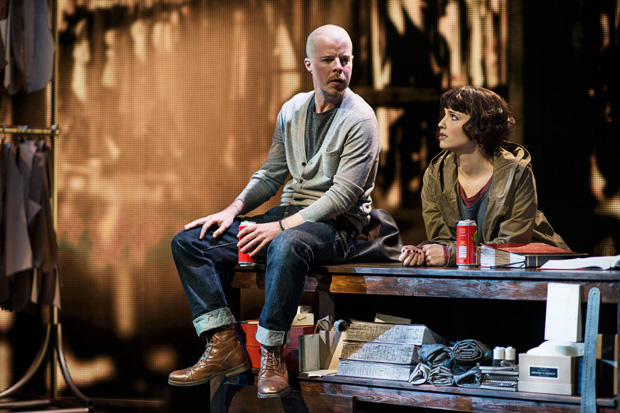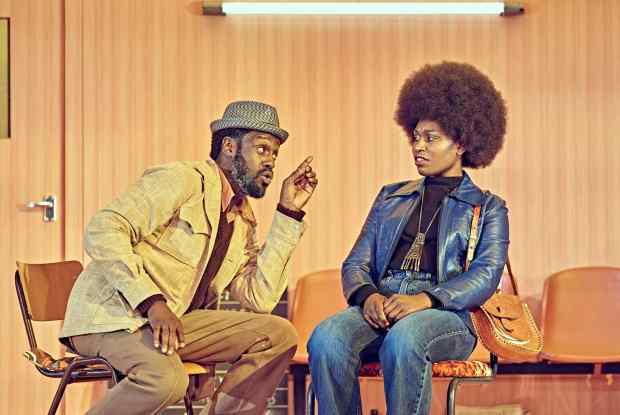St James Theatre hosts a new play about Alexander McQueen (real name Lee), whose star flashed briefly across the fashion world before his suicide in 2010. It opens with a mysterious stalker, Dahlia, breaking into McQueen’s Mayfair home and demanding that he make her a dress. ‘I’m calling the police,’ he shrieks but she placates him and they embark on a surreal odyssey to his childhood haunts where they meet his mentors past and present. A pretty clunky start. Who is Dahlia? A dramatic ploy, a figment of McQueen’s imagination or a real person? We don’t know so we don’t care about their relationship. Still less about her flipping dress. Every word that she prattles, and she prattles a lot of them, descends like rainfall downstream of a hydro-electric plant.
McQueen is the powerhouse here and the best details take a good while to emerge. The rag trade had caught the contagion of modern art long before McQueen broke through. Knocking up the frocks was the easy part. He also had to baptise each collection with a rhetorical motif, or ‘concept’, that would satisfy the gabblers and commentators that feed off couture. The theme needed to have a fairy-tale simplicity and grandeur but it also had to carry the clarity and potency of a world-class advertising campaign. Four times a year — spring, summer, autumn and winter — McQueen had to dream up one of these multifaceted straplines to wow the marketeers and the scribblers. It wasn’t fun. Meanwhile, he was dressing difficult stars like Bjork, who performed on stage in a frock made out of ‘2,000 microscope slides’. It tinkled. Or, as he puts it, ‘she made it an instrument’.
The silliness, isolation and opulent futility of this high-pressure life come across very forcefully. And we get a taste of McQueen’s unique skills. He didn’t use patterns but could cut and shape clothes on a mannequin. No other designer had this level of inventive dexterity. But the production fails him, alas, and the garment he creates on stage looks like a pound-shop puffball disaster. The writing creaks in places. Elsewhere it amazes. In a scene that reveals McQueen’s obsessive creativity, he spots a lonely blonde idling in a swanky restaurant. He maps out her entire psychological background from small clues offered by her hair tint and hem length, the tilt of her shoulder, the angle of an out-thrust leg, and the tap-tap-tap at the table with a hand that itches to hold a cigarette. This is bravura writing. The production by John Caird keeps one foot planted firmly on the catwalk. Each scene ends with a burst of laboured pirouetting performed by strutting beefcakes and twiggy dancers wearing fashion-show absurdities: corsets, 18-inch heels, skull-bandages, incontinence girdles (men included). I’m not sure what the point of this semi-good, semi-wonky play is. It cost a packet, that’s for sure. It may be a luxury workshop for a future movie funded by millionaires. If so the backers will be impressed by a promising script and by Stephen Wight, as McQueen, who brings out his coarse, angry, witty and sensitive delicacy. He’s got the part.
More rag-trade larks at the Young Vic. You can’t just watch World Factory. You have to join in. Theatre-goers sit at tables in a darkened warehouse where they play at running a Chinese sweatshop under the guidance of show-off actors hectoring them in English and Mandarin. Huge video screens show industrial scenes from Shanghai along with worrying quotes by Engels and other Victorian reformers to prepare us for the atrocities ahead: labourers bullied, serfs cudgelled, chimney sweeps starved, babies plucked from sucked-dry breasts. What a disappointment. We watch fat, sleek, nicely dressed Chinese people stitching away at cruising speed in clean, bright buildings. Haste? No sign. Sweat? Not a drop. They talk to camera and explain that employers have to compete for their labour with bonuses, free Wi-Fi, extra overtime and evening classes. Mistreated workers just push off and find a better boss. A female executive discusses ownership, which she regards as a risky but rewarding venture that involves social obligations.
Amazing. Thatcherite propaganda at the Young Vic. The Engels quotes, presumably, are a kind of security blanket for left-leaners who can’t approach a real-life factory without a dunce’s wisdom to cling to. The screens also carry information that only a kid or a bumpkin with the IQ of a flip-flop would need: textile manufacture uses water; synthetic fibres are derived from oil; shifting fabrics from China to Britain consumes fuel. What a terrible advert this play is for its audience. ‘Work’ has become an exotic safari animal that Londoners will pay to encounter in carefully controlled surroundings. I expect the Labour leadership hopefuls will see this show so they can add it to their CVs under ‘work experience’. Probably the nearest they’ll get.
Got something to add? Join the discussion and comment below.
Get 10 issues for just $10
Subscribe to The Spectator Australia today for the next 10 magazine issues, plus full online access, for just $10.
You might disagree with half of it, but you’ll enjoy reading all of it. Try your first month for free, then just $2 a week for the remainder of your first year.














Comments
Don't miss out
Join the conversation with other Spectator Australia readers. Subscribe to leave a comment.
SUBSCRIBEAlready a subscriber? Log in